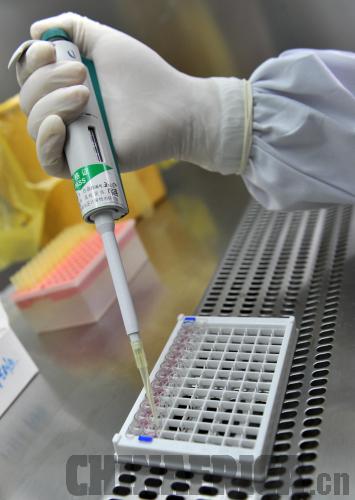|
 |
|
TESTS: Fabricating reagents for AIDS detection (ZHANG AILIN) |
In recent years, a mysterious malady has left thousands of Chinese in trepidation and dubitation. People suffering from the disease display symptoms very similar to AIDS, such as swollen lymph nodes, subcutaneous bleeding, joint pain, fatigue, night sweats and emaciation, but they repeatedly test negative for HIV, according to media reports. This mysterious infectious condition was dubbed "HIV-negative AIDS."
On April 6, China's Ministry of Health dismissed such concerns, saying no new virus confirming so-called "HIV-negative AIDS" had been found. Some medical experts believe these "patients" might suffer from some kind of psychological AIDS phobia.
On May 10, the ministry held a press conference, restating that no evidence suggested the "patients" suffered from an infectious disease.
However, Zhong Nanshan, an outspoken health expert, known for exposing the SARS cover-up in 2003, claimed on May 6 that "HIV-negative AIDS" is more than a mental health problem, citing an independent study he led.
"The condition was not simply caused by mental problems," Zhong, Director of the Guangzhou Institute of Respiratory Diseases, told the Guangzhou-based New Express Daily, adding that most of the alleged sufferers involved in his study suffered reactive arthritis.
Just panic?
Since 2004, a group of people living with "HIV-negative AIDS" has been obsessively subjecting themselves to health checks seeking an explanation for their AIDS-like symptoms.
They reported a history of high-risk sexual encounters or blood transfusions preceding the onset of symptoms. However, not one of these people had tested positive for the HIV virus. Confused and anxious, they gradually came together through networking on the Internet. They shared their conditions and feelings and tried to seek help and attention from the government and public.
In 2009, they came to the attention of the Ministry of Health. According to the ministry's spokesman Deng Haihua, the ministry first received relevant reports in June 2009, and the Chinese Center for Disease Control and Prevention (CDC) started to investigate the situation one month later.
As of 2010, the ministry had received 59 reports of people with the condition in Beijing and Shanghai, as well as in the provinces of Jiangsu, Zhejiang, Hunan and Guangdong.
In 2009 media began paying attention to and reporting the cases. According to the Hong Kong-based Oriental Daily News, people infected with so-called "HIV-negative AIDS" believed they had a mysterious HIV-like virus or an AIDS-like condition that cannot be detected with current testing technology.
The newspaper reported that the mysterious virus could be spread through saliva and blood.
In response, Zeng Guang, CDC's epidemiology chief scientist, held the country's first government-initiated study of the issue, which involved experts in infectious diseases and mental health professionals.
In 2009 and 2010, the CDC offered free HIV tests to the 59 patients. No evidence was found of HIV or any new virus.
There was no mutation of the AIDS virus found in the sample tests, said Liang Lianchun, a member of the CDC special research team of the AIDS-like symptoms.
The CDC performed a second test in May 2010 to check whether the patients were carrying xenotropic murine leukemia virus-related virus (XMRV), a virus discovered in 2006 that is believed to be connected to chronic fatigue syndrome. The tests were again negative, and the CDC concluded the patients weren't suffering from chronic fatigue.
Blood samples from each patient were also sent to a laboratory at the University of Southern California in the United States in January this year. By the end of March, there was no report of any unknown virus found in one third of the samples, Zeng said.
"Since no new virus has been found, I firmly believe this group cannot be carrying a new human virus. The reason we sent the blood samples abroad is to prove to them that the illness is only in their minds," he said.
On April 6, the Ministry of Health released the results to the public. To date, none of the tested "patients" have suffered any infection-caused organic abnormalities, nor any cases of any serious illness or death.
|